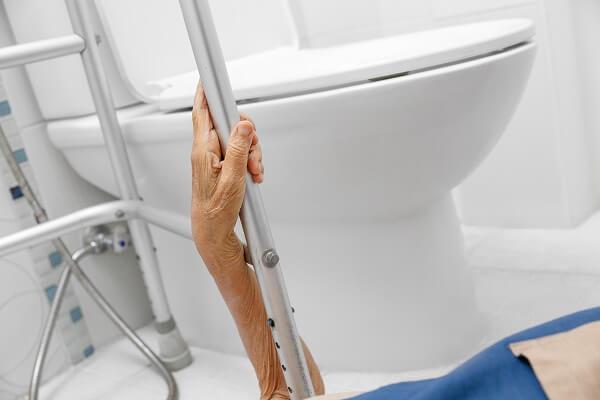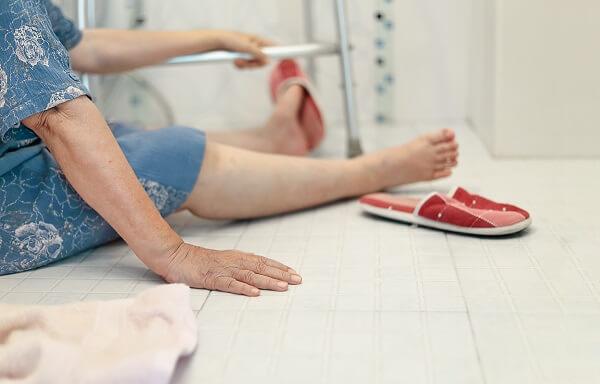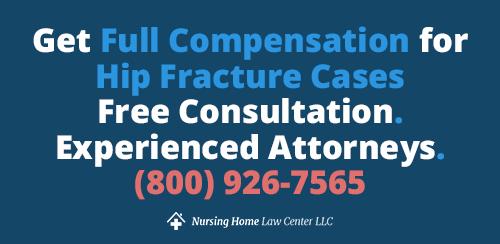The Nursing Home Law Center is committed to providing the legal resources necessary to hold negligent facilities accountable.
Nursing Home Hip Fracture Lawyer
Helping Elderly Patients Recover Compensation for Broken Hip Injuries
A broken hip can dramatically alter an elderly person’s quality of life, creating substantial pain, increased medical bills, and often permanent disabilities. At the Nursing Home Law Center, we advocate fiercely on behalf of nursing home residents who have suffered serious injuries, including hip fractures, due to negligence or abuse in nursing facilities.
Our law firm has a strong track record of successfully obtaining significant compensation for families impacted by nursing home neglect. Some of our notable case results include:
- $1,700,000 for a nursing home resident who suffered a severe broken hip and subdural hematoma resulting from a preventable nursing home fall.
- $600,000 on behalf of a wheelchair-bound nursing home patient who experienced a serious hip fracture and broken femur when improperly transferred by a nursing staff member using a Hoyer Lift without the required two-person assistance as outlined in her care plan.
- $299,000 for a resident who sustained a fractured hip shortly after admission due to inadequate supervision by facility staff.
Understanding Hip Fractures in Nursing Homes
Hip fractures are among the most common and severe injuries elderly nursing home residents can experience. These injuries significantly impact the health, independence, and overall quality of life for older adults.
Nursing Homes’ Duty to Prevent Hip Fracture Injuries
Federal regulations clearly outline nursing homes’ responsibility to implement effective safety measures to protect residents from avoidable injuries, including hip fractures.
Under 42 CFR §483.25(d), nursing facilities receiving Medicare and Medicaid funds must provide adequate supervision and assistance devices to prevent accidents, such as falls resulting in broken hips.
Additionally, the CMS State Operations Manual – Appendix PP mandates facilities to conduct comprehensive fall-risk assessments, maintain personalized care plans, and establish secure environments through facility regulations.
Practical measures nursing homes must take to effectively protect residents and reduce hip fracture risks include:
- Placing cushioned floor mats to soften the impact if a resident falls out of bed or a wheelchair
- Installing bed alarms that promptly alert staff when residents attempt to leave their beds
- Using properly fitted bed rails to help prevent residents from exiting beds without assistance
- Ensuring call bells or emergency alerts are always accessible, allowing residents to request help easily
- Maintaining clean, uncluttered floors and walkways to reduce tripping hazards
- Providing residents with non-slip socks or footwear to enhance traction and stability
- Using padded garments (“hipsters”) designed to absorb impact and reduce injury risk from falls
- Regularly supervising residents identified as high-risk to prevent unsupervised walking or transfers
- Implementing consistent toileting schedules to ensure residents receive timely assistance, reducing the likelihood they’ll attempt self-toileting without help
Common Causes of Hip Fractures Among Elderly Nursing Home Residents
Understanding the most common causes and risk factors associated with broken hips is essential for keeping nursing home residents safe. Identifying the exact cause of a fractured hip isn’t always simple, but negligence often plays a significant role.
Falls
Falls are by far the most common cause of hip fractures in long-term care settings. Nursing homes have a responsibility to provide adequate staffing and maintain safe, hazard-free environments.
Facilities failing to uphold these duties—such as not staffing enough employees, poor facility maintenance, inadequate lighting, or cluttered floors—can be considered negligent.

Transfers & Mobility Assistance
Falls leading to broken bones and fractured hips frequently occur during resident transfers or while providing mobility assistance. Nursing home staff members using incorrect lifting or transfer techniques can cause residents to fall, resulting in severe injuries such as broken hips.
Additionally, the improper or inconsistent use of assistive devices (e.g., Hoyer lifts, wheelchairs, walkers) may further increase injury risk, making the skilled nursing facility liable for any harm caused.
Non-Traumatic Causes
Not all nursing home hip fractures result directly from falls or trauma. Non-traumatic hip fractures can occur spontaneously in older adults with osteoporosis or brittle bones, even without an apparent accident or injury.
Poor nutritional support, inadequate medical management of osteoporosis, insufficient physical therapy, or lack of proper monitoring by nursing home staff can significantly increase the risk of these non-traumatic hip fractures.
Hip Fracture Types and Treatment Options
Hip fractures in nursing homes can vary significantly in severity and complexity. The treatment required typically depends on the fracture’s specific location, the type of injury, and the overall health of the resident.
Common types of hip fractures include the following:
Intracapsular: Occurs within the capsule of the hip joint, involving the head or neck of the femur. Usually treated using screws and plates to stabilize the femur’s head and neck and preserve joint function, these fractures often disrupt blood supply, increasing complications and healing difficulties.
Intertrochanteric: Occurs between the greater and lesser trochanters—prominent bony projections on the femur. These fractures are common in nursing home falls and typically require surgical stabilization through implants, such as compression screws or intramedullary nails, which secure the bone through plates and screws to maintain alignment during healing.
Subtrochanteric: Occurs below the lesser trochanter, involving the upper portion of the femoral shaft. Due to its location, this type of fracture often requires more extensive surgical intervention. It’s generally repaired using intramedullary nails placed directly into the femur, supplemented by screws and locking plates to ensure stability and promote proper bone healing.
In addition to surgical treatments, residents typically need ongoing medical care, pain management, and physical therapy to recover mobility and improve their quality of life after a hip fracture.
Broken Hip Consequences and Damages
A broken hip can be devastating for elderly nursing home residents, often causing severe pain, reduced mobility, and diminished quality of life. Complications may include infections, permanent disability, prolonged medical care, or even death.
Legally, families can seek compensation for these physical consequences through damages such as medical expenses, ongoing rehabilitation costs, pain and suffering, emotional distress, loss of enjoyment of life, and wrongful death damages, should the broken bone lead to a fatality.

Filing a Nursing Home Broken Hip Personal Injury Lawsuit
A broken hip can be financially and emotionally devastating for elderly nursing home patients and their families. On average, hip surgery and follow-up rehabilitation alone typically cost over $50,000 in medical bills. This amount does not even include the considerable value associated with the resident’s pain, suffering, reduced quality of life, and emotional distress.
At Nursing Home Law Center, our attorneys understand these significant impacts and fight to recover full and fair compensation for your loved one’s injuries. We’ll hold negligent facilities accountable, helping you navigate the legal process and pursue the maximum possible settlement or award.
Reporting a Nursing Home Broken Hip Injury
If your loved one suffered a broken hip due to suspected nursing home abuse or neglect, promptly report your concerns by:
- Immediately contacting local law enforcement if intentional harm or immediate danger is suspected.
- Using the skilled nursing facility’s internal complaint process
- Filing an official complaint for nursing homes receiving Medicare or Medicaid funds through your State Survey Agency / Department of Health
- Filing a complaint with your state’s Long-Term Care Ombudsman
- Reporting suspected elder abuse or neglect to Adult Protective Services (APS)
- Consulting an experienced nursing home abuse attorney to pursue civil action or compensation.
Compensation Awarded in Nursing Home Hip Fracture Cases
Compensation amounts in nursing home hip fracture cases vary widely depending on injury severity, treatment costs, pain and suffering, and negligence involved. Typical settlements range from tens of thousands to several hundred thousand dollars. Severe cases involving wrongful death or significant neglect can result in awards exceeding one million dollars.

Statistics on Hip Fractures in Nursing Homes
- Falls are responsible for over 95% of hip fractures among older adults in nursing homes.
- Nearly a quarter of hip fracture patients die within a year of the fracture, and half have major declines in independence.
- Almost all hip fracture cases involve falls from standing height.
- Hip fracture risk is higher in falls initially directed sideways or forward, as opposed to backward or straight down.
- Each year, over 300,000 older adults sustain broken hips in the United States, many of whom reside in nursing homes or assisted living facilities.
- After experiencing a hip fracture, around 6% of nursing home residents suffer another fracture within six months, 12% within one year, and 21% within five years.
- Mortality following hip fractures is high among nursing home residents, with approximately 23% dying within six months, 31% within one year, and 60% within five years.
Consult an Experienced Nursing Home Broken Hip Lawyer!
Many broken hip injuries in nursing homes are preventable. If your loved one suffered a serious hip fracture due to a nursing home’s negligence, you may be entitled to compensation to cover medical bills, physical therapy costs, pain and suffering, and other damages.
At the Nursing Home Law Center, our experienced attorneys are ready to guide your family through the legal process after a devastating hip injury. Contact us today at (800) 926-7565 for a free consultation or complete our online form. Let us help you get the justice and compensation your family deserves.
Common Nursing Home Injuries

